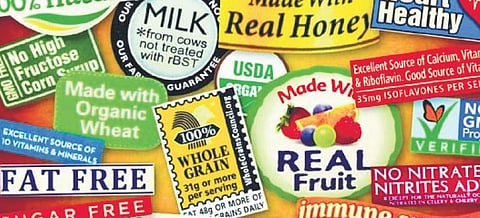

NEW DELHI: A national think tank on nutrition policy said on Wednesday that all pre-packaged food products should have front-of-pack labelling to indicate salt, sugar and saturated fat content to warn the public.
According to Dr Arun Gupta, the convenor of National Advocacy in Public Interest (NAPi), a national think-tank on nutrition consisting of independent medical experts, paediatricians and nutritionists, the increased consumption of these products is directly associated with obesity, type-2 diabetes, hypertension, heart disease, chronic kidney disease, cancer and adverse mental health.
Demanding that all pre-packaged food products should have front-of-pack labelling (FOPL) instead of displaying ‘health star rating, as is being proposed, he said the Food Safety and Standards Authority of India (FSSAI) has blundered on a draft food policy, which they have put up for comments.
If not changed substantially, the draft regulation of Labelling and Display is unlikely to achieve the intended objective. The FSSAI mandate is to ensure, which food is safe for Indian consumers, he said. He added many countries, including Chile, Mexico and Israel are already following FOPL.
Robust scientific evidence indicates that pre-packaged food products which are usually industrial formulations and marketed are responsible for increasing the salt/sugar or saturated fat content of one’s diet. Quoting new findings, Dr Gupta said that the prevalence of high BP in Indian adolescents is substantially high -one in three -and coexists with other cardiovascular disease risk factors, he said, adding that this calls for interventions to reduce the consumption of foods high in sugar, salt, or saturated fats.
Dr Gupta said there is no scientific evidence that adding a positive factor or nutrient, like vegetables/ fruit/ nuts etc., to an unhealthy food product would reduce the risk of disease. Dr Vandana Prasad, a member of NAPi and a public health expert, said that considering that the draft of certain regulations to amend further the Food Safety and Standards (Labelling & Display) Regulations, 2020 is being brought out in the interest of people’s health, it is a fundamental flaw to rate foods from ‘least healthy to healthiest’ and include the notion of declaring warnings against foods that are accepted as being unhealthy.
“The vehement response by the food industry against any form of FOPL is testimony to the fact that it depends on massive profits. Does the FSSAI exist to protect their interests or the interests of the consumer? This is the question that this draft raises,” she said. Having policies to reduce the consumption of such food products will impact the dietary habits of populations and preserve traditional diets, she added. “By sticking to a focal point of high sodium, total sugar and total fats, front-of-pack labels will not allow the industry to play around with the algorithms of unhealthy foods,” said Ashim Sanyal, COO, a voluntary organisation in interest of consumer education (VOICE).
KEEPING HEALTH ON FRONT
All pre-packaged food products should have front-of-pack labelling (FOPL) instead of displaying ‘health star rating’, as is being proposed
Many countries, including Chile, Mexico and Israel are already following FOPL
Robust scientific evidence indicates that pre-packaged food products which are usually industrial formulations and marketed are responsible for increasing the salt/sugar or saturated fat content of one’s diet